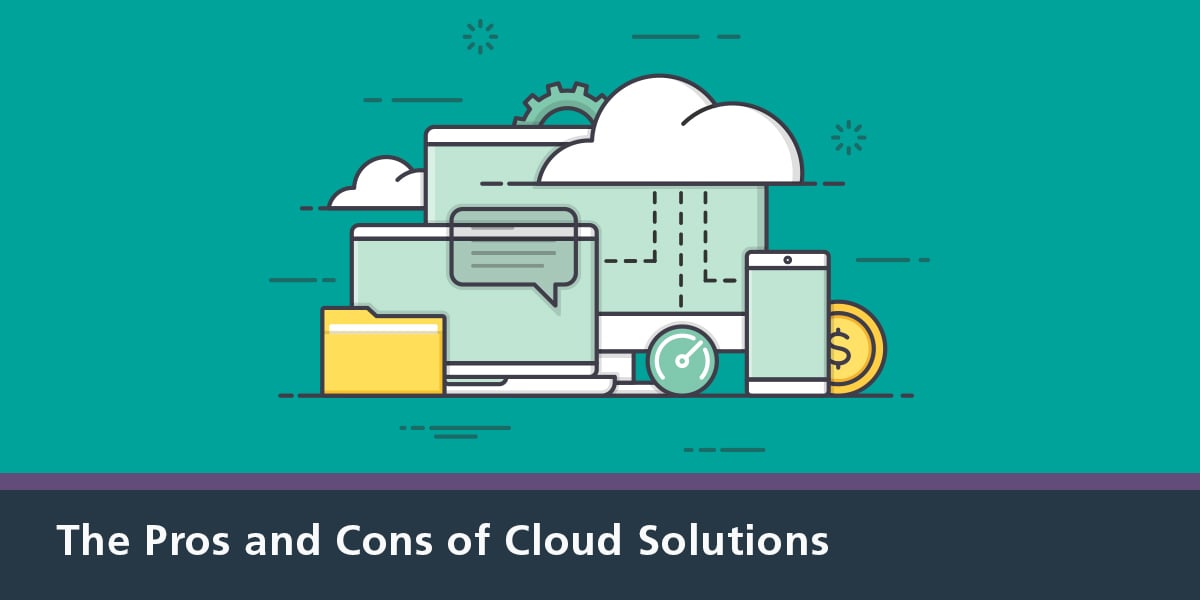The Pros and Cons of Cloud Solutions
 Cloud Solutions promise it all: unbridled computing capabilities, access from anywhere at any time, and storage capacities to handle massive amounts of data modern businesses are expected to manage. It is easy to get starry-eyed about the potentials of this technology, especially when cloud computing has become so wildly popular.
Cloud Solutions promise it all: unbridled computing capabilities, access from anywhere at any time, and storage capacities to handle massive amounts of data modern businesses are expected to manage. It is easy to get starry-eyed about the potentials of this technology, especially when cloud computing has become so wildly popular.
Public clouds pose several risks that may make this technology inappropriate for businesses. Cloud services are amazing, but they are not a cure-all for improving business efficiency and productivity.
The Hidden Risks of Cloud Solutions
Cloud solutions are known for reducing costs, improving accessibility, and allowing companies to perform data computing tasks beyond what their native current infrastructure allows.
However, with these advantages come risks that are sometimes not obvious or carefully considered.
1. Latency and server problems will impact business operations – Companies choose cloud-based services because outsourcing infrastructure is less of a headache. However, this also means downtime and latency are outside of a company’s control. This becomes more of a problem when a company shares space with other operations on a public cloud. Just like when someone ties up bandwidth by downloading massive files, other users on the public cloud can throttle accessibility for everyone. In addition, bandwidth restrictions can throttle access to the cloud, limiting accessibility and productivity.
2. Big data has big questions about ownership – Lack of visibility with cloud services is another major factor that companies should consider. This also includes where data resides once it has been put on the cloud and exactly who owns this data.
Most contracts from major vendors indicate that whoever uploads the data owns it. However, that will not stop vendors from locking companies into contracts and rendering them dependent on the services. It also does not mean that data created on the cloud will necessarily belong to the company and not the vendor.
3. Anticipating needs and Budgets is harder than it looks – Although companies choose cloud services because of scalability, scalability in the cloud is hard to understand.
Cloud service vendors enjoy large fee structures, costs of services, and what is or is not included at each price tier. Combine these factors with a miscalculation about what a company needs and many businesses end up paying for too much or end up paying for the wrong service.
4. Compliance Requirements can get Complicated – The healthcare industry, financial services, and other similar industries have strict compliance guidelines that they are required to follow. Using cloud infrastructure in these industries can become more trouble than it is worth if not addressed correctly. A shift in the cloud infrastructure may cause a company to become noncompliant without realizing it. Therefore, companies will need to implement new compliance measures that were not previously thought of before.
Companies can also have compliance issues when they only think about
Concealed Costs
The other major risk associated with cloud services involves unexpected costs. Businesses are sometimes hit with unexpectedly large bills because they do not understand what they are purchasing or what their business truly needs. These unexpected bills can occur:
- During egress from the cloud.
- By signing up for “free” services that are, in fact, trials.
- Through paying for potential capacity, not actual capacity.
- By requesting services or features which cost extra.
- As a result of bugs or glitches, which spike server traffic.
- From rogue cloud resource usage by employees.
The true cost of cloud computing is rarely visible unless focused planning and proper governance occur. Avoid these costs through:
- Turning services off when they are not being used.
- Using cloud computing strategically, and not for everything.
- Restricting access to cloud solutions on a need-to basis.
Benefits of Keeping Data Private
It may be more appropriate from a business standpoint to build dedicated infrastructure rather than relying on a public cloud or cloud service. Some of these business needs may include:
1. Control of Data – Organizations such as those handling personal health insurance need to retain full control of data storage, transmission, and use.
2. Resource Dedication – Dedicated cloud computing capabilities do not suffer from downtime or latency problems caused by neighbors on the cloud.
3. Cost Visibility – Operating private infrastructure prevents expensive mishaps such as paying for unanticipated — but needed — equipment, purchasing too much storage, or requesting support that is not included in the purchased package.
4. Better Customization – Customization often drives up the cost of cloud computing services. Organizations requiring customized cloud solutions may consider looking into building their own.
Do Not Stay Foggy About Cloud Solutions
Cloud solutions are a powerful, flexible way to bring new capabilities to a business and there are many instances where such technology is appropriate. However, the hype around cloud infrastructure sometimes blinds users to the risks associated, especially the concealed costs.
Avoid getting caught off guard with an unmanageable bill by taking the time to understand the nature of cloud infrastructure and the services it offers. Contact an expert at RJ Young today to learn what is right for your organization.